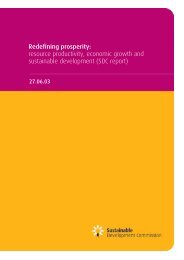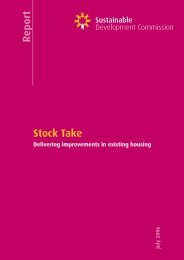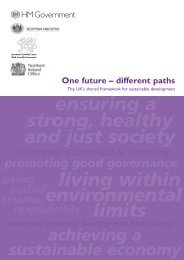Every Child's Future Matters - Sustainable Development Commission
Every Child's Future Matters - Sustainable Development Commission
Every Child's Future Matters - Sustainable Development Commission
Create successful ePaper yourself
Turn your PDF publications into a flip-book with our unique Google optimized e-Paper software.
Priority 3: Climate change<br />
Can children achieve economic wellbeing in the face<br />
of climate change? Sir Nicholas Stern didn’t think so.<br />
If our prosperity is tied to the health of the planet,<br />
then many of the hard-earned improvements<br />
to children’s wellbeing that the government<br />
is currently trying to secure will be undone.<br />
The consequences of inaction are already being<br />
felt in areas like changing patterns of weather and<br />
disease, food security, human migration and loss<br />
of biodiversity, and will intensify dramatically over<br />
the lifetimes of the present younger generations.<br />
Across Europe it has been estimated that between<br />
15,000 and 52,000 people died from heat in the<br />
summer of 2003. 132 By 2060 the Hadley Centre<br />
predicts that these conditions will be considered<br />
‘unusually cool’. 133 Given the high value placed on<br />
children in society, it is surprising that we continue<br />
to dump problems like climate change, waste buildup,<br />
pollution and freshwater scarcity on children – a<br />
contradiction that is creating a mixture of fear and<br />
frustration among many of them. As champions of<br />
children’s interests, those involved with children’s<br />
policy and services have a unique opportunity to<br />
challenge environmental irresponsibility wherever<br />
it arises.<br />
Response 3<br />
For children’s sake, all programmes, policies and<br />
initiatives brought forward by government and public<br />
service providers at all levels should be screened for<br />
their contribution to sustainable development, and<br />
challenged if they cannot be accomplished within<br />
environmental limits. Similarly, public services<br />
providers should take every opportunity to promote<br />
low-carbon ways of living to their stakeholders and<br />
exhibit this in their own buildings, operations and<br />
behaviours.<br />
Example<br />
Originally motivated by the savings to be<br />
made from renewable and community<br />
energy systems, Woking Council now has a<br />
climate change strategy which seeks to take<br />
a carbon neutral approach to the future of<br />
services and activities within the Borough.<br />
The planning system’s primary objective in<br />
Woking is sustainable development and new<br />
developments must be built to a standard<br />
that is resilient to future predicted changes<br />
in climate. All services must contribute to the<br />
aims of the climate change strategy.<br />
The Aalborg Commitment has been signed<br />
by 104 local authorities in the UK. It aims to<br />
provide a framework for local authorities to<br />
embed sustainability into their organisation<br />
through 50 commitments spread equally<br />
across ten themes covering economic, social,<br />
environmental and governance issues.<br />
“I do not like how people think that everything will last forever.” (age 12-14)<br />
“There seems to be no respect for the world whatsoever.” (age 15-19)<br />
“Soon the world won’t be worth living in,<br />
then they’ll [adults] be complaining!” (age 12-14)<br />
<strong>Sustainable</strong> School consultation respondents 134<br />
<strong>Every</strong> Child’s <strong>Future</strong> <strong>Matters</strong> 43








